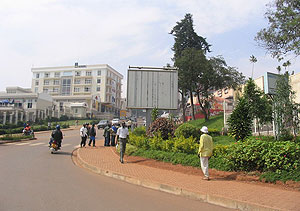Editor, In your paper yesterday was the report in which the World Bank recognizes Rwanda as one the fastest growing economies on the African continent and one of its success stories, despite being a land locked country and having few natural resources.


Editor,
In your paper yesterday was the report in which the World Bank recognizes Rwanda as one the fastest growing economies on the African continent and one of its success stories, despite being a land locked country and having few natural resources.
While this affirmation from one of the world’s renowned development institutions should be truly commended, what is far more noteworthy is rather the real story that it tells.
It is the story of how the successful policies of a government and the firm resolve of a people are in fact transforming and improving the lives of the citizens with each passing day.
I recently read in the Economist magazine one of the ironic and contradictory stories you could ever expect to find in any news organisation that should otherwise be characterised by excellence in news reporting.
The magazine carried a story titled "Progress and Repression in Rwanda” in which it praises tremendous advances in the economy, Information Technology, education, infrastructure, agriculture as well in foreign affairs among others, but then shamelessly struggled to discredit all those positives with allegations of a lack of political and press freedoms.
This makes you wonder which benchmarks some critics use to understand the life of a nation and the progress of its people.
The World Bank statement certainly rejects the legitimacy of these and other critics and serves not only as a genuine vote of confidence, but also as one among many powerful bits of evidence that Rwanda is well on the road to prosperity.
What it simply means is that while the government and the people of Rwanda value true and accurate critical opinions, they should and will not relent or be deterred in their efforts to transform their nation with an eye fixed on noble national aspirations for progress and prosperity.
It should also serve as a reminder that in the short, medium or long-term, such grand national interests, objectives and goals may sometimes not coincide with those of the critics.
Felicien Mwumvaneza
Wageningen University, The Netherlands


